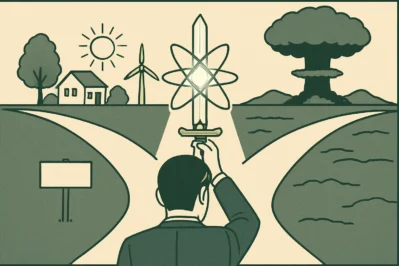Debating the Nuclear Dilemma Like a Pro in Korean
Hello! It’s your favorite Korean upgrade guide, Maeil Hangeul!
Ready to elevate your Korean from everyday conversation to sophisticated debate? Today, we’re diving into a challenging but fascinating topic: the problem of nuclear proliferation and the future of the non-proliferation regime. You might think this is just for news anchors, but you’d be surprised! Lately in Korea, a hit new documentary on global security has sparked intense discussions online and among friends. Being able to articulate your thoughts on complex global issues is a key sign of advanced fluency. Let’s equip you with the language to join that conversation!
Core Expressions for Your Diplomatic Toolkit
Here are the essential terms you need to discuss international security with nuance and precision.
1. 핵확산 (Haek-hwak-san) / 핵 비확산 (Haek Bi-hwak-san)
- Pronunciation [Romanized]: [Haek-hwak-ssan / Haek Bi-hwak-ssan]
- English Meaning: Nuclear Proliferation / Nuclear Non-Proliferation
- Detailed Explanation: This is the foundational vocabulary for our topic. It’s a formal term composed of Hanja (Sino-Korean characters): 핵(核) for “nuclear,” 확산(擴散) for “proliferation/spreading,” and 비(非) for “non-.” You will encounter this term constantly in Korean news articles, academic papers, and televised debates about international relations. It’s a must-know for any serious discussion on the subject.
2. 억지력 (Eok-ji-ryeok)
- Pronunciation [Romanized]: [Eok-jji-ryeok]
- English Meaning: Deterrence / Deterrent Power
- Detailed Explanation: This is a key concept in military and political strategy. 억지(抑止) means “to restrain or suppress,” and 력(力) means “power.” Together, 억지력 refers to the power to prevent an adversary from taking action. In the context of our topic, it specifically refers to “nuclear deterrence”—the idea that possessing nuclear weapons discourages other states from attacking. This is a high-level term that will make you sound incredibly knowledgeable.
3. 양날의 검 (Yang-nal-ui geom)
- Pronunciation [Romanized]: [Yang-nal-ui geom]
- English Meaning: A double-edged sword
- Detailed Explanation: This is a powerful and common idiom used to describe something that has both significant benefits and significant drawbacks. 양(兩) means “both,” 날 means “blade,” and 검 means “sword.” The pursuit of nuclear technology is a classic example: it can provide a nation with immense energy (nuclear power) and security (억지력), but it also carries catastrophic risks. Using this idiom shows a deep, metaphorical understanding of the language.
4. 딜레마에 빠지다 (Dillema-e ppajida)
- Pronunciation [Romanized]: [Dillema-e ppa-ji-da]
- English Meaning: To fall into a dilemma; to be in a predicament
- Detailed Explanation: This versatile phrase combines the English loanword 딜레마 (dilemma) with the verb 빠지다 (to fall into). It perfectly describes a complex situation with no easy solution, where any choice has negative consequences. The global nuclear issue, where nations feel compelled to arm themselves for security while increasing global risk, is a perfect example of a profound dilemma.
Example Dialogue: Post-Documentary Chat
Let’s see how these expressions play out in a natural conversation between two friends, Min-jun and Sophia, after watching a popular documentary on the topic.
A (Min-jun): 소피아 씨, 어제 새로 나온 안보 다큐멘터리 봤어요? 핵확산 문제가 정말 심각하게 다뤄지더라고요.
[Sophia-ssi, eoje saero naon anbo dakyumenteori bwasseoyo? Haek-hwak-san munjega jeongmal simgak-hage darwojideoragoyo.]
Sophia, did you see the new security documentary that came out yesterday? It dealt with the issue of nuclear proliferation so seriously.
B (Sophia): 네, 봤어요. 일부 국가들이 핵무기가 강력한 억지력을 제공한다고 주장하는 부분은 정말 생각할 거리를 많이 주더군요.
[Ne, bwasseoyo. Ilbu gukga-deuri haengmugi-ga gangnyeokan eok-ji-ryeok-eul jegonghandago jujanghaneun bubun-eun jeongmal saenggak-hal geori-reul mani judeogunyo.]
Yes, I did. The part where some countries argue that nuclear weapons provide powerful deterrence really gave me a lot to think about.
A (Min-jun): 맞아요. 그게 바로 핵무기가 가진 양날의 검 같은 속성이죠. 안보를 위한 선택이 오히려 전 세계를 위험에 빠뜨릴 수 있으니까요.
[Majayo. Geuge baro haengmugi-ga gajin yang-nal-ui geom gateun sokseong-ijyo. Anbo-reul wihan seontaeg-i ohi-ryeo jeon segye-reul wiheom-e ppatteu-ril su isseunikkayo.]
Exactly. That’s the double-edged sword nature of nuclear weapons. A choice made for security could actually endanger the whole world.
B (Sophia): 그래서 국제 사회가 이러지도 저러지도 못하는 딜레마에 빠진 것 같아요. 정말 어려운 문제예요.
[Geuraeseo gukje sahoe-ga ireojido jeoreojido mot-haneun dillema-e ppajin geot gatayo. Jeongmal eoryeoun munjeyeyo.]
That’s why it seems the international community has fallen into a dilemma, unable to move one way or the other. It’s such a difficult problem.
Cultural Tip & Deeper Dive: Geopolitics in Daily Korean Life
Given South Korea’s unique geopolitical position, conversations about national security, international relations, and deterrence are not just academic. They are a part of mainstream public discourse. You will frequently hear terms like 억지력 and 핵확산 on prime-time news debates (시사 토론 프로그램) and read them in newspaper editorials (신문 사설).
When you, as an advanced learner, use an idiom like 양날의 검 to describe the nuclear dilemma, you are not just translating a concept. You are showing that you grasp the profound and often tragic complexity of the issue—a nuance that is deeply understood and appreciated by native Korean speakers. It signals that you can engage with the topic on an intellectual and philosophical level.
Let’s Practice!
Time to put your new vocabulary to the test and solidify your understanding.
- Fill in the Blank: The NPT (Nuclear Non-Proliferation Treaty), known in Korean as the ‘핵확산금지조약’, is a global agreement to prevent the spread of nuclear weapons, in other words, to stop ________.
- Your Turn to Analyze: Think of another topic (e.g., artificial intelligence, social media, genetic engineering) that can be described as a 양날의 검 (double-edged sword). Write a short sentence in Korean explaining why.
Great job today tackling such a complex topic! You’re well on your way to discussing global affairs with the confidence and sophistication of a native speaker.
Share your answer to the practice questions in the comments below! We’d love to see your thoughts.






